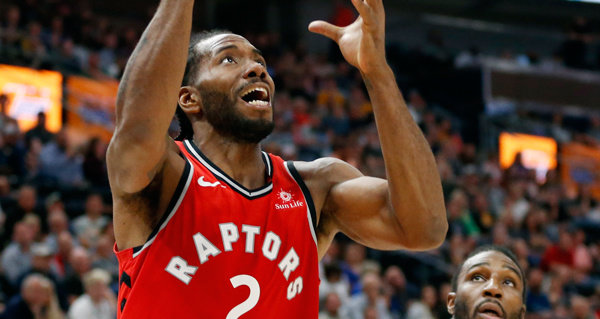Throughout the Eastern Conference playoffs, before they reached The Finals, the Toronto Raptors were at times dragged into excellence by Kawhi Leonard. Culturally sore after consecutive years of postseason disappointment, the team looked on the verge of conscribing into regionally mystical notions about being fundamentally incapable of “getting over the hill,” competitively speaking. DeMar DeRozan, the man the team traded to the San Antonio Spurs for Leonard last summer, very much fed into this tropedom by recently calling himself the “sacrificial lamb” of the Raptors’ violent blossom into championship contention; Leonard, in reference to his demonstrably hobbled physical state, said during The Finals that he is “100 percent when [he’s] on the floor. No excuses.”
There’s a pretty big gap between the literary ambition of the recent statements from these two men, with DeRozan coming across like a jaded poet, while Leonard coming across like mostly mute worker—or the most possibly deeply engaged worker, as the finest-tuned poetics of athletic zen blur the line between the two powerfully. This is, in any event, is Leonard at his absolutely most figurative. Maybe the coldest superstar the league has ever seen and certainly its most rhetorically literal, Leonard—much unlike the near-entirety of his NBA colleagues—is permanently skeptical of bluster. After winning Finals MVP in 2014 by equalizing LeBron James in his Spurs’ rout of the Miami Heat, ESPN’s Stuart Scott tried to crack into the ostensible charisma of the then-22-year-old. “Who is Kawhi Leonard?” he asked. In his now famous monotone, which does not betray skepticism or annoyance or anything else so warm, Leonard replied with what seemed to him the only possible words: “Kawhi Leonard.”
This past week, a report aggregating the stories of his college teammates has brought to light Leonard’s incredibly factual forms of trash talk: “Bucket,” he’d say during practice, upon draining jumpers. “Board,” he’d say, when rebounding. “No,” he’d say, on defense, when cutting off an opponent’s driving angle. All of this is hilarious to close followers of the NBA, because Leonard’s humanity is so hidden, so personal and private, and every little bit we get to glimpse into it is a tease into the soul of the person who plays perfectly without showing one. Imagine if the train that flies you around downtown, but could also kill you if you stepped to it wrong, grew a face and started drily saying: “I’m more powerful than you.”
Toronto, as a team, has responded remarkably well to the lead-by-example objectivity of Leonard’s ways. It’s impossible to imagine the superstar giving a rousing locker room speech, but the mark of his spirit on the team’s championship run is unmistakable. They are no longer any more prone to mental or spiritual lapses than any other title fighter; in fact, they are noticeably allergic to the psycho-emotional flights and swoons that result from deviation from median performance. All the team’s dips below average performance are just blips to be lived out, as are the staggering highs above it. The DeRozan-to-Kawhi heart transplant has turned the Raptors into a singularly unfazed enterprise, persistently ready to punch when they look down, because they never processed anyone’s story about them being down. Fate physically manifest, Kawhi may not be enough to take over the league, but his head will never stop him from doing so, and the Raptors have learned to be more like him.
The aggressive, 47-point offensive onslaught from Stephen Curry in Game 3 of the Finals—even with a depleted Golden State Warriors cast—would’ve been enough to scare away any team ready to suck down the dynastic dread that the Warriors cast across the NBA. But Leonard, either because he has transcended it or because he is simply too literal to know it, is unmoved by the pressures that this dread imparts. The man who does not speak but only does, and always superbly does, is the ultimate anchor. The Raptors reacted to Curry’s offensive like it were a minor lag in internet connectivity, and stayed consistently logged onto the game, approaching the Warriors like a math problem they had every calculator they needed to solve. Golden State’s three titles in the four previous years were of no emotional significance to the Raptors, who a year ago trembled in the proximity of any shadow, of a whisper, about LeBron James.
The Finals are still ongoing, and even as the Raptors stand as favorites with a considerably healthier roster, we can be certain that such forecasting isn’t impacting how Leonard approaches the game. His vision of what he needs to do will always be of a myopia that the rest of us, muddleheaded enough to get to the end of this column, cannot comprehend; laser-like is not hyperbolic enough to describe Leonard’s focus, but more importantly, it’s a description that works against a style that trends fundamentally away from metaphor or simile. The Warriors are in their toughest battle yet because they’re more damaged than ever, but also because they’re up against a team defined by a man who erases all of the defending champions’ weighty cultural intangibles, by living in a way incapable of caring about them. Long live Kawhi’s steady, uncaring knife through the stories that we’re ready to tell.



